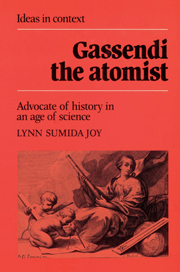Book contents
- Frontmatter
- Contents
- Preface
- List of illustrations
- INTRODUCTION
- PART 1 HUMANIST HISTORIOGRAPHY
- PART 2 PHYSICS AND THE HISTORY OF PHILOSOPHY
- 5 Unrecognized cultural baggage: the incoherence of contemporary debates about atoms
- 6 Uncertainties of observation and explanation: the role of optical anomalies in astronomy
- 7 Skepticism is based on bad history: Gassendi interprets Epicurus' arguments concerning the existence and qualities of atoms
- 8 Epicurus' conception of proof and Gassendi's historical justification of an atomist metaphysics and physics
- 9 Between culture and nature: was Gassendi a historian, a scientist, an empiricist?
- List of abbreviations used in the notes
- Notes
- Index of names
5 - Unrecognized cultural baggage: the incoherence of contemporary debates about atoms
Published online by Cambridge University Press: 01 September 2009
- Frontmatter
- Contents
- Preface
- List of illustrations
- INTRODUCTION
- PART 1 HUMANIST HISTORIOGRAPHY
- PART 2 PHYSICS AND THE HISTORY OF PHILOSOPHY
- 5 Unrecognized cultural baggage: the incoherence of contemporary debates about atoms
- 6 Uncertainties of observation and explanation: the role of optical anomalies in astronomy
- 7 Skepticism is based on bad history: Gassendi interprets Epicurus' arguments concerning the existence and qualities of atoms
- 8 Epicurus' conception of proof and Gassendi's historical justification of an atomist metaphysics and physics
- 9 Between culture and nature: was Gassendi a historian, a scientist, an empiricist?
- List of abbreviations used in the notes
- Notes
- Index of names
Summary
The sources of Gassendi's conviction that his historical studies of Epicurus' philosophy were relevant not only to the writing of history but to the actual practice of science itself were many and varied. These sources were generally not of his own making, and Gassendi at first perceived them as shortcomings of the ongoing scientific discussions in which he participated during the 1630s and 1640s. Although he had conducted regular astronomical investigations during the 1620s in Provence, in the company of Peiresc and under the tutelage of the astronomer Joseph Gaultier, Gassendi's participation in Europeanwide discussions of physical and astronomical problems began to be notable in the following decade with activities such as his observation of the transit of Mercury and his contribution to the solution of Poysson's problem. The latter problem was typical of the kind of loosely structured, open-ended inquiries which comprised a significant part of natural philosophy during the first half of the seventeenth century. Gassendi's discussion of it shows us certain of his early attempts to define the legitimate scope of natural philosophical arguments and to question the manner in which mathematics was being used by several influential contemporaries. However, it is equally significant because it was one of Gassendi's first encounters with the incoherencies of ongoing debates about the nature of atoms. He received the problem in 1635 at a critical time in the development of his atomist ideas, just a year after completing his biography of Epicurus.
- Type
- Chapter
- Information
- Gassendi the AtomistAdvocate of History in an Age of Science, pp. 83 - 105Publisher: Cambridge University PressPrint publication year: 1988

